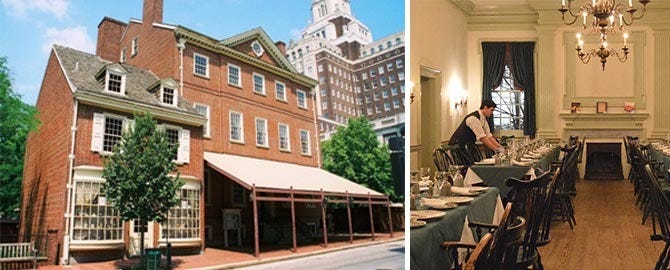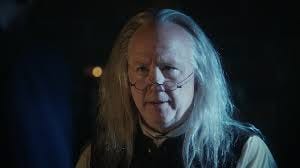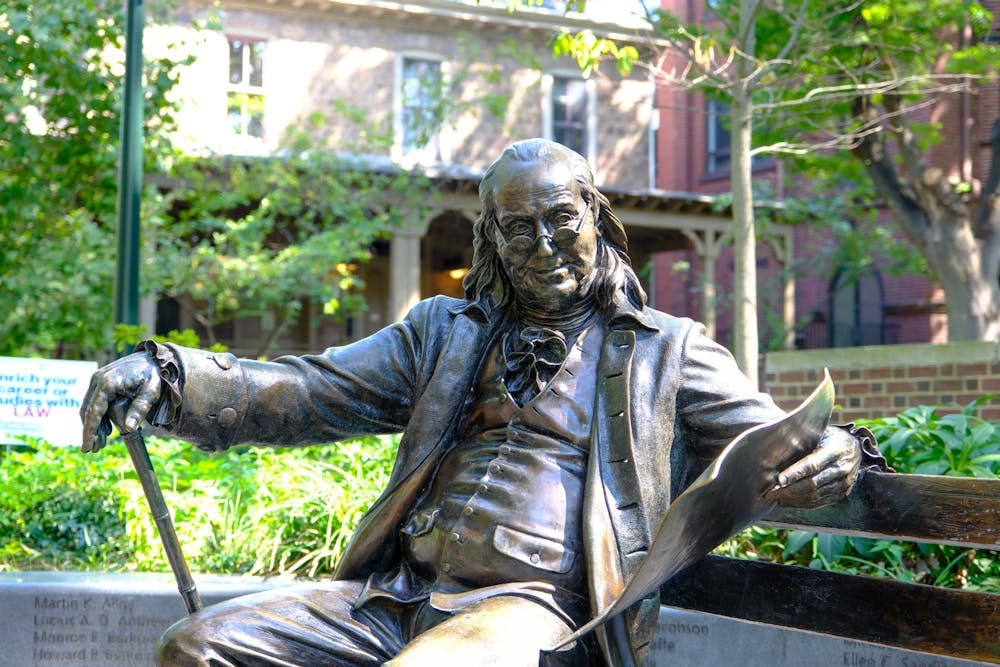Ben Franklin is Visited
A post-Constitution Day satire: Founding Father Ben Franklin briefs his Constitutional Convention colleagues on a dream featuring a visit to September 17, 2024
This is more historical fiction than satire. But there is a lot of truth here.
It was a sunny, bright, frigid morning in downtown Philadelphia, Pennsylvania, on September 18, 1787. Yesterday’s high temperature didn’t reach 50 degrees Fahrenheit, and lows hovered just above freezing. That differed from the hot summer days they endured when many of America’s leaders gathered to write a new Constitution.

After a night of celebration at the City Tavern, a couple of blocks from Independence Hall, a few of the previous night’s celebrants gathered for a late breakfast. They had just signed a new, if imperfect, Constitution that would soon be presented to the nation’s 13 colonies for ratification. Nine were needed, and they knew it would be a slog.
Virginian James Madison was already at work on amendments that several states said were needed to correct deficiencies that Ben Franklin, 81, admitted existed. They were exhausted and ready to head home after an arduous process, none more so than the convention’s presiding officer and a hero of the newly-formed republic, George Washington. Everyone recognized that he would be its first President when elections rolled around next year - if at least nine states ratified the Constitution.
Franklin bolted up from his bed later than usual - he was a notoriously early riser - from his center city accommodations. He reached for his nightstand, his heart racing and hands shaking as he fumbled for his spectacles as the morning sun streamed through his windows. Clumsily affixing them to his head, he looked around and realized what he’d experienced was a vivid dream. He exhaled deeply as he fell back into his bed, exhausted, his mind swirling with what he had just experienced, grateful that it was over.
“Has the future paid a visit, or is last night’s Printer’s Punch talking?” Franklin queried himself, referring to his favorite beverage, a heady concoction of brandy, lemon juice, nutmeg, sugar, water, and hot whole milk.
He was taking deep breaths to still his beating heart. “No, this had to be a nightmare,” he pondered. But he wasn’t sure. The infirm Franklin called for help as he arose to prepare for the morning, which included visiting the nearby City Tavern with convention colleagues to discuss the battles ahead in each colony for ratification.

Delaware and Pennsylvania would be no problem and would probably ratify the Constitution by Christmas, Franklin pondered as he was helped with his shirt. Those were two of the four states whose delegates unanimously approved the Constitution. There were real battles ahead in states complaining about the lack of a Bill of Rights. Still, the Constitution’s amendment process and leadership from Virginia’s James Madison would hopefully address that.
Franklin was helped to his carriage outside 322 Market Street, followed by a short ride to the Tavern. If he were a younger man, he would have happily walked it, he mused. As he arrived, he was assisted from his carriage by two fellow delegates arriving simultaneously, including fellow Pennsylvanian James Wilson, who read Franklin’s final speech at the convention before it closed. Wilson was assisted by Jonathan Dayton, who, at 26, was the youngest delegate. He was from New Jersey.
Wilson and Dayton helped escort Franklin into the Tavern and upstairs, where they had spent considerable hours and imbibed heavily the night before. The smell of ale and Madeira brought back memories of the night before, if not a little regret over how much was consumed.
“Dr. Franklin!” extolled the diminutive Madison as he bolted upright and smiled, the first to spot Franklin as he entered, sitting at the head of a table with other delegates. Dayton quickly guided his mentor to sit at the oblong table beside the windows overlooking Second Street towards the Delaware River. “We weren’t sure you would be able to make it. Are you alright, sir, you seem shaken?”
The ashen faced Franklin settled himself and looked around the table to see who had assembled. The Pennsylvania and Delaware delegations were there, as was Alexander Hamilton, the only member of the New York delegation to sign the Constitution along with two others from South Carolina and New Jersey.
“To answer your question, my fine friend from Virginia, I had the most dreadful visit from a spirit last night,” Franklin said, nearly whispering. “Perhaps it was only a nightmare.”
“Please tell us about it,” Dayton asked, leaning into Franklin, “was it about the future?”
Franklin quickly turned to his youthful colleague. “Yes! And I can tell you the year.” Franklin looked around as his colleagues, on the edge of their seats, were eager to hear of Franklin’s experience, who paused as he looked around the table.
“The year was 2024.” The delegates looked at each other quizzically as Pennsylvanian Robert Morris did some quick math. “That’s 237 years from now,” he declared. “I can’t imagine.”
“Where, pray tell?” Madison asked. “Both here in Philadelphia and at another city where our nation’s capitol was located,” Franklin replied. “A large domed building, much like St. Paul’s Cathedral in London. Even the President had a home, a large, beautiful white home.
“That sounds wonderful,” Dayton said. “So, America was still a country in 2024? That, sir, is splendid news!”
Silence fell over the table as Franklin, looking forlorn, shook his head.
“Remember what I spoke to you yesterday?” Franklin said. “When I told the convention that this new government can only end in despotism as other forms have done before it, when the people shall become so corrupted as to need despotic government, being incapable of any other?
“I have seen the time when it enters voluntarily, even enthusiastically, into despotism, and with thunderous applause,” Franklin said, peering down as he pondered his words.
Silence embraced the table as Madison sat back, a look of horror on his face. The others looked at each other, some confused by Franklin’s premonition.
“What was it, sir, that led to our downfall? Was it a blow from a great foreign power?” asked Wilson.
“No, my dear friend, it was from within,” Franklin said firmly, taking a sip from his tea. “The people allowed their government, even begged them, to eliminate the very liberties we must insert into our constitution, including freedom of speech, religion - even of the press. The right to bear arms, the right to be secure in their homes, both gone. And no city descended into darkness and lawlessness deeper and more tragically than this one, Philadelphia.”
John Dickinson of Delaware gasped as he reached for a cup of tea.
“It worsens,” Franklin said, sitting up. “I saw the names of their two leading candidates for the presidency, and also their fellow candidates for vice president, somewhat different from what we have arranged,” Franklin said. “One of the candidates they call ‘Orange Man.’ The other is a woman of many nationalities,” Franklin noted, “who speaks in a language I do not understand. Orange man seems to be the subject of multiple assassination attempts. And the press blames him for it.”
“They both speak of democracy and freedom,” Franklin noted, “but at least one of them has proposed doing the opposite, even as they call their opponent a dictator and a ‘threat to democracy.’ Words they project mean something different than reality.
“A woman who sings a funny song leads what they call a ‘disinformation governance board’ of the United States government,” Franklin added as Madison looked on in horror. They experienced an epidemic, like our smallpox epidemic, but worse, where governments closed schools and businesses, and made people wear masks, and worse.
“I even had a vision this City Tavern was shut down, permanently, with the governor of this very state picking those enterprises that would live or die.” Franklin added. “God forbid it!” James Wilson stood and yelled as he pounded the table with his fist.
“Have seat, my friend, because it worsens,” Franklin says. “Children taught not the Bible, but able to . . . how do I say this . . . pick their sex. School teachers shield their students from their parents, and governments punish them for not allowing medical procedures that permanently alter their lives.
“What?” Madison said, leaning forward. “How does one pick their sex? Is it not determined in the womb by God Almighty?”
“It appears not, my dear Mr. Madison,” Franklin said. “In my vision, the President even nominates a woman to serve on the Supreme Court who cannot define what a woman is,” Franklin adds. “My head spins in wonder. Worse, she is confirmed by the United States Senate.”
“My God,” Dayton exclaims, “what kind of US Senate is that? And a woman serving in government? I don’t know what to say to that.”
“It is a different world, my young friend. And you should see the public debt. Ours is large after the Revolution,” Franklin adds. “Can anyone here add to the number 35 trillion?”
“Thirty-five trillion what?” Hamilton asks incredulously. “Surely you do not mean American currency? Such debt is unimaginable and death to any society.”
“Yes, the public debt exceeds the sum of the value of all goods and services, and the country is not even at war,” Franklin adds. “And neither the public nor either candidate seems concerned. There is no plan or discussion to reduce it, only to spend more money or reduce taxes further to favored constituencies.
“The politicians have learned to bribe the people with their own money and that of their children and grandchildren.
“My dear Franklin, what of slavery?” asked Dickinson, who was in the process of freeing his slaves. “Does it exist? Is it gone?”
Franklin sits quietly and ponders his colleagues’s question. “It appears gone as we know it, yet it is replaced with new forms, or perhaps old ones. “Children and women are procured as slaves - they call it ‘human trafficking.’ A slavery of the mind, an indoctrination that tolerates no dissent,” Franklin opines.And the heavy boot of government rests on the face of any dissent.”
Silence.
“And you should see how they open our borders to invasion. The vision is too awful to repeat, with migrants overwhelming towns and cities and rumors of them eating cats and dogs and whatnot,” Franklin said, planting his face into his palms. “Such a nightmare. I shall never recover.”
Silence again looms over the table as they digest the dystopian vision of a future Franklin shared, wondering if it might be true.
“Gentlemen,” Franklin exclaims, “it is only a vision. It may or may not occur. If it be true, then this great nation we are creating has more than two centuries of life—more than I suspected! But if this vision is true, we must prepare and equip every generation with the knowledge and wisdom we hand down from the ages.”
“How can we do that, my dear Dr. Franklin?” arose a voice not yet heard around the table. “Could we see evil forces march through our institutions and destroy all we have created?” asked Robert Morris.
“What about our legal system?” asked another New Jersey delegate, William Paterson. “Does it survive?”
“I am uncertain,” Franklin said. “The government’s judicial system was weaponized against its political opposition. The ruling party’s government prosecutes its major opponent, slaps on the wrists of their favored friends and family members.”
“My God, just like King George, and worse!” Paterson exclaimed. “May God forbid it. I will do my part to protect and defend our new Constitution. Justice must be impartial, and blind! We have written our document to prevent such abuse, have we not?”
“Indeed we have, indeed you will, my dear Mr. Paterson, and indeed it is,” Franklin says, motioning for help to arise as he prepares to leave. “We all will. The question is, will eternal vigilance survive such a time as I envisioned? The election of that year had not happened in my vision. If our future countrymen choose poorly, our dive into despotism will surely be complete.
“Good day, Gentlemen, and God bless; we have much work to do,” Franklin says as he grabs his cane and, with help from Dayton and Wilson, prepares to descend down to the Second Street entrance to meet up with his carriage back to his home on Market Street.
“We have created a marvelous Republic. If we can keep it.”
Jonathan Dayton from New Jersey would serve as a Member of the US House and briefly as US Senator. Due to his massive land holdings in Ohio, the city of Dayton is named after him.
William Paterson served as a justice in the US Supreme Court and governor of New Jersey.
James Wilson, who read Franklin’s last speech delivered to the Constitutional Convention, also served as a justice on the US Supreme Court.
Robert Morris, who helped launch the Bank of America also served in the United States Senate, fell into financial ruin and spent time in a debtor’s prison.
The City Tavern operated successfully on federal lands for nearly three decades, but it closed during the pandemic and never reopened.
Delaware was the first state to ratify the Constitution on December 7, 1787. Pennsylvania followed five days later. The ninth state, New Hampshire, ratified the Constitution on June 21, 1788. Despite Virginia’s profound influence on both the Constitution and the Convention, it would be the tenth state to ratify the founding document days after New Hampshire. Eventually, all thirteen original colonies ratified the Constitution by May 29, 1790. Rhode Island was the last one.







It is hard to imagine what the Founders would think of us today, but you make an excellent effort here.